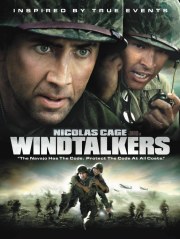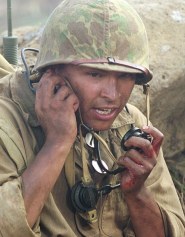|
Windtalkers
|
| |
 |
USA, 2002. Rated R. 133 minutes.
Cast:
Nicolas Cage, Adam Beach, Christian Slater, Mark Ruffalo, Peter Stormare,
Noah Emmerich, Roger Willie, Frances O'Connor, Brian Van Holt, Martin
Henderson, Jason Isaacs
Writers: John Rice, Joe Batteer
Music: James Horner
Cinematographer: Jeffrey L. Kimball
Producers: Terence Chang, Tracie Graham, Alison R. Rosenzweig,
John Woo
Director: John Woo
LINKS
|
 ew
foreign filmmakers have arrived in the United States as hotly anticipated as
John Woo when he relocated from Hong Kong. Given Hollywood's generous budgets,
it was expected that Woo's U.S. achievements would surpass even his fine Hong
Kong films. Now, nine years and five major studio releases later, that artistic
success has yet to materialize. Even though the box office results have been
good, only Face/Off came close to the fevered ectasy of The Killer
and Hard Boiled. Hard Target?
A Van Damme vehicle designed only to get Woo's feet wet in America. Broken
Arrow? Good-looking crap. Mission: Impossible
II? Strictly a studio picture--a sequel with a recycled 007 plot.
ew
foreign filmmakers have arrived in the United States as hotly anticipated as
John Woo when he relocated from Hong Kong. Given Hollywood's generous budgets,
it was expected that Woo's U.S. achievements would surpass even his fine Hong
Kong films. Now, nine years and five major studio releases later, that artistic
success has yet to materialize. Even though the box office results have been
good, only Face/Off came close to the fevered ectasy of The Killer
and Hard Boiled. Hard Target?
A Van Damme vehicle designed only to get Woo's feet wet in America. Broken
Arrow? Good-looking crap. Mission: Impossible
II? Strictly a studio picture--a sequel with a recycled 007 plot.
In Windtalkers, Woo continues to display visual artistry, but it's not
directed with the imaginative abandon of The Killer or even Face/Off.
Of course it isn't. This is, after all, a World War Two movie intent on recognizing
the achievements of under-appreciated Navajo Indians who served in the Marines,
where they used their native language as the basis of a radio code never broken
by the Japanese. Serious stuff. Woo seems overly conscious of that, excising
the balletic, slow-motion splendor of the fight choreography and foregoing the
romantic intimacy between the camera and the leading men that you find in other
Woo films. Instead, he has made a conventional war drama that retains only two
things distinctly Woo: the mobile camerawork of the spectacular battle sequences
(always tracking the action and thrusting the viewer into the fray) and the
unabashed melodramatics.
Woo has a made a film that would make Randall Wallace blush. In The Killer,
given the unusual context, the virtuoso artistry, and the cinematic passion,
Woo's melodramatics work. In Windtalkers, they serve only to cast a harsh
light on an outrageous collection of war movie clichés. Every development is
telegraphed and obvious (save, perhaps, one).
If the film's antihero (Nicolas Cage) receives orders to "protect the code"
(i.e., to kill his Navajo ward rather than allow him to fall into enemy
hands), you know for a fact that he will be confronted with a Difficult Decision
before film's end. If, furthermore, that same antihero is tormented by the memories
of losing an entire platoon in a previous battle, you know for a fact that he
will again be asked to assume command of his platoon in a Desperate Situation.
Also, if the Navajo protagonist (Adam Beach) is repeatedly belittled by a racist
comrade (Noah Emmerich), you know for a fact that the Navajo will eventually
save the other's life, causing him to recognize the Error of His Ways. Even
more obviously, if the platoon occupies a seemingly safe, calm village, you
know for a fact that all hell is going to break loose. Those who deserve their
come-uppance, get it. Those who require redemption, find it. How fortunate that
wars are replete with such tidy storylines!
Despite the pat plotlines, Windtalkers does have some narrative gaps
and loose ends. For instance, the presence of Frances O'Connor as a nurse who
unfathomably takes a shine to the dour, self-obsessessed Sergeant Enders (Cage)
adds little, appealing though O'Connor may be. Her role seems to be to attempt
to convince us that there is something likeable about Enders. Eventually, she
disappears from the film.
A more central problem is that Windtalkers fails to achieve its goal
of relating the history of the Navajo codebreakers (not that one necessarily
goes to a film like Windtalkers, or any non-documentary, desiring to
be educated). The movie doesn't get close to any of the characters, except Enders,
to whom it's not particularly pleasant to be close. The Navajos, privates Ben
Yahzee (Beach) and Charles Whitehorse (Roger Willie), get a lot of screen time,
but they are treated with a sort of arm's-length reverence. There's not much
reason to care who lives and who dies.
The battle sequences are exceptional--one expects nothing less from Woo, and
he delivers. By themselves they provide almost enough of a raison d'être
for Windtalkers. Then again, there have been quite a few films recently
(ever since Saving
Private Ryan) that have offered spectacular war footage, so there's
not much point in seeking out Windtalkers just for that. When the guns
are quiet, you'll find yourself checking your watch, and wondering whether Woo
will ever again direct with great passion, and if he does, whether he will have
anything new to say.
Review
© June 2002 by AboutFilm.Com and the author.
Images © 2002 MGM (Metro-Goldwyn-Mayer) Pictures. All Rights Reserved.


